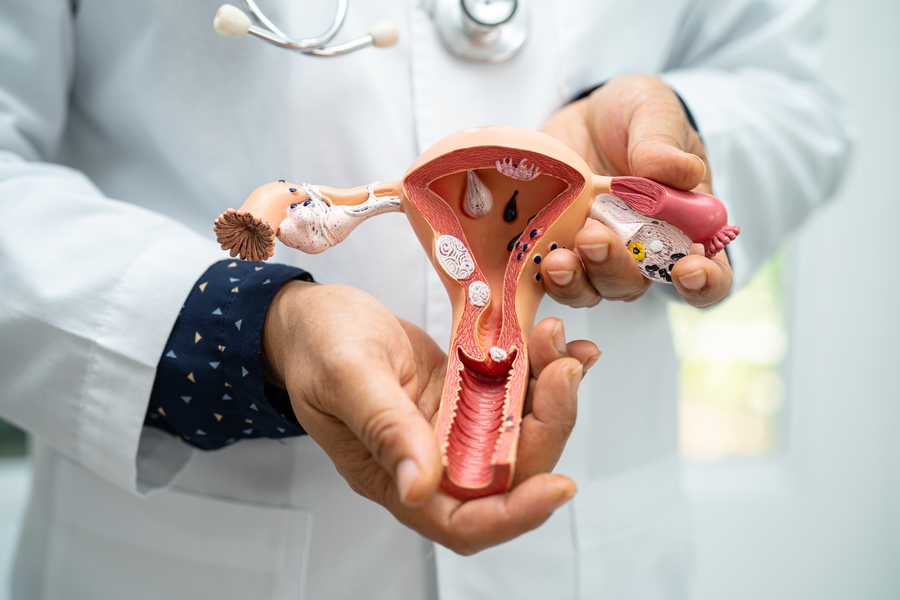Ectopic Pregnancy
Ectopic pregnancy refers to a pregnancy that attaches and grows outside of the uterus. An ectopic may grow inside the fallopian tube, on the ovary, cervix, in the abdomen or c/section scar. 90% of ectopic pregnancies occur within the fallopian tube, specifically the ampulla. Ectopic pregnancies account for approximately 2% of all pregnancies.
While the diagnosis of ectopic pregnancy is infrequent, it can be a life threatening condition, especially if the ectopic ruptures and causes bleeding into the abdomen and pelvis. For this reason, it is important to know what signs and symptoms to look for and when to contact your OBGYN. Typical symptoms of an ectopic or a ruptured ectopic pregnancy include:
- Vaginal bleeding.
- Abdominal pain or cramping, may be mild or severe.
- Missed or absent periods.
- Nausea/vomiting.
On physical exam, the physician may feel a mass or reproduce severe abdominal/pelvic or cervical tenderness. Sometimes a patient may not have any symptoms and the diagnosis may be made via blood work and ultrasound imaging. On imaging, the findings may be described as an adnexal or pelvic mass that has characteristics consistent with ectopic.

An ectopic is diagnosed by the combination of patient symptoms, physical examination findings, lab work specifically HCG (the pregnancy hormone) and ultrasound imaging. Your physician may trend your HCG as well as obtain a repeat ultrasound before making this diagnosis. If the diagnosis is not apparent, the physician may perform a diagnostic laparoscopy, a surgical procedure that examines your abdomen and pelvis.
Many women with ectopic pregnancies possess risk factors that increase their risk of ectopic pregnancies, but approximately 50% women with no known risk factors suffer an ectopic pregnancy.
Most common risk factors:
- Prior ectopic pregnancy -10% risk of a repeat ectopic after one previous ectopic and more than 25% risk of repeat ectopic after two or more previous ectopic pregnancies.
- Pelvic Inflammatory Disease and some STDS like Chlamydia.
- Previous tubal or pelvic surgeries.
- Smoking.
- History of tubal sterilization.
- History of infertility.
- IVF.
- IUDs (intrauterine devices).
- Age greater than 30.
Risk of ectopic pregnancy does not increase in oral contraceptive users, women who used Plan B and it failed, previous elective termination or previous C- sections.

Once the diagnosis of ectopic has been made, your OBGYN will discuss with you the different treatment options, as well as make recommendations based on your history, physical exam and clinical findings. It is important to understand these options and recommendations as some are more time intensive than others.
Treatment options:
-
Medical management with methotrexate. This is a medication that interferes with DNA formation and stops actively dividing cells thus causing resolution of the pregnancy. There are several regimens – single, double and multi-dose regimens, the choice of which will be made by your physician. This medication is injected into the muscle and may cause nausea, vomiting, abdominal pain, diarrhea, vaginal bleeding, mouth sores, lab abnormalities and very rarely hair loss.
Patients who receive methotrexate will require close outpatient follow up, including lab draws to follow hcg levels to zero.
Due to the biomechanics of methotraxate , it cannot be administered to patients with:
- Pregnancy within the uterus.
- Allergy to methotrexate.
- Clinically unstable.
- Active lung disease.
- Peptic Ulcers.
- Severe anemia, low platelets or WBC or abnormal liver function tests.
- Breastfeeding.
- Inability to follow up as an outpatient.
Additionally, patients should stop taking prenatal vitamins or folic acid supplements, avoid foods rich in folic acid and avoid NSAIDS as all these may interfere with MTX activity. Lastly, patients should not have sex, get pregnant, engage in strenuous exercise and should avoid alcohol and prolonged exposure to sunshine during treatment or in the follow up period. Your physician will discuss with you timing for resumption of regular activity or subsequent trial of pregnancy. Research, although limited, shows that methotrexate does not affect future fertility.
- Surgical Management - requires an operation to take out the pregnancy tissue. If the pregnancy is in the tubes, the OBGYN may either open the tube and aspirate the tissue or remove the entire tube. This surgery is generally performed laparoscopic ally, (via small incisions on the belly) but may be done through a larger abdominal incision (laparotomy). This decision is generally made by the OBGYN at the time of surgery. Patients are generally able to go home the day of surgery after a laparoscopic procedure and may go home or stay overnight in the hospital after a laparotomy.
- Expectant or conservative management lets your body clear the pregnancy without medication or surgery and is generally reserved for patients who are clinically stable and who have low HCG levels.

In summary:
- Ectopic pregnancy occurs in 2% of all pregnancies, and specific risk factors increase their occurrence. However 50% of patients diagnosed with an ectopic pregnancy have no known risk factors.
- A ruptured ectopic maybe life threatening and requires immediate medical attention.
- There are 3 main treatment options – conservative or expectant, medical or surgical management. Each option has its own benefits and risks which will be reviewed by OBGYN in detail.
- Patients who have had one ectopic pregnancy have an increased risk of a subsequent ectopic and this risk is greater than 25% in patients who have had two or more ectopic pregnancies.
References:
- Tubal Ectopic Pregnancy. Practice Bulletin No. 191. American College of Obstetricians and Gynecologists. Obstet Gynecol 2018.
- Ectopic Pregnancy, FAQ 155, February 2018. ACOG.org.
Patients who receive methotrexate will require close outpatient follow up, including lab draws to follow hcg levels to zero.
Due to the biomechanics of methotraxate , it cannot be administered to patients with:
- Pregnancy within the uterus.
- Allergy to methotrexate.
- Clinically unstable.
- Active lung disease.
- Peptic Ulcers.
- Severe anemia, low platelets or WBC or abnormal liver function tests.
- Breastfeeding.
- Inability to follow up as an outpatient.
Additionally, patients should stop taking prenatal vitamins or folic acid supplements, avoid foods rich in folic acid and avoid NSAIDS as all these may interfere with MTX activity. Lastly, patients should not have sex, get pregnant, engage in strenuous exercise and should avoid alcohol and prolonged exposure to sunshine during treatment or in the follow up period. Your physician will discuss with you timing for resumption of regular activity or subsequent trial of pregnancy. Research, although limited, shows that methotrexate does not affect future fertility.
Roseanne Gichuru, DO/MBA obtained her undergraduate degrees in Cellular molecular biology & Women`s Studies from WestChester University. She obtained her Medical Degree from Philadelphia College of Osteopathic Med and her MBA from St. Joseph University. She completed her obgyn residency at Crozer Chester Medical Ctr. She currently practices in PA.
No disclosures.














